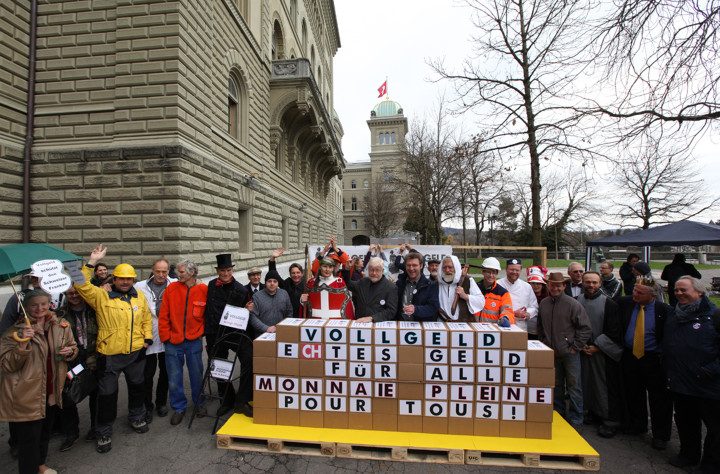Berne – The referendum campaign for the Sovereign Money Initiative is being presented in Berne today. The people bringing the initiative put a question to the Swiss voters: Who should be allowed to create our Swiss francs? Private commercial banks like UBS and CS in the interests of their shareholders? Or the Swiss National Bank in the interest of the country as a whole?
The Sovereign Money Initiative poses a very important question for Switzerland: Who can manufacture our Swiss francs – i.e. create money? Who is to be given this power and privilege, which, by implication, is also linked to social responsibility? Who is to benefit from the creation of money and the billions in profits from it? Who should be allowed to exercise the huge power related to this?
Money rules the world – but who rules money?
“The Sovereign Money Initiative launches a fundamental discussion about who is better placed to have the power and privilege of money creation to ensure the overall well-being of our country. Private commercial banks with their duty to maximise shareholder value and which are answerable to their shareholders around the world? Or an institution such as the Swiss National Bank, which has a constitutional mandate and is obliged by law to work for our country, and whose profits benefit everyone?” asks Dr. Reinhold Harringer from the initiative committee. The Sovereign Money Initiative aims to transfer the right to create money completely to the Swiss National Bank, as was actually envisaged after a referendum in 1891 on changes to the Federal Constitution.
The creation of money as a public service
The Sovereign Money Initiative advocates for a separation of powers in the monetary system: money creation by the Swiss National Bank. Lending by the private sector. The private commercial banks will continue to be responsible for lending, payment transactions and asset management. However, with the Sovereign Money Initiative, money becomes a public good, a public service, where the profit from producing this money will benefit the general public – and not, as today, the shareholders and managers of big banks.
UBS and CS create most of our money
The two big banks UBS and CS produce around 50 percent of our electronic Swiss money (1). Today, 60-80 percent of UBS and CS shares are held by foreign investors. “It is unacceptable that foreign banks create our Swiss money,” says economist and former banker Sergio Morandi, who is helping to organise the Sovereign Money campaign in Ticino. The creation of money by private banks leads to an erosion of Swiss sovereignty and, due to high associated debt, to a restriction of the political and social capacity to act.
The Sovereign Money Initiative: advantages for all
Today, commercial private banks generate 90 percent of the money in circulation, namely all electronic money – i.e. the numbers in our bank accounts (book money). Because banks combine making a profit with money production, they often create too much money, which leads to financial bubbles and currency devaluation. Moreover, electronic money is insecure because it – in contrast to cash – can disappear in financial crises when banks become bankrupt. With Sovereign Money, electronic money becomes as secure as cash in a safe, and society can no longer be blackmailed by banks which are “too big to fail”. And fewer financial bubbles will arise because, with Sovereign Money, the National Bank can control the money supply again.
Note:
(1) Calculation of the share of money creation by different banking groups (in German): https://www.vollgeld-initiative.ch/vorteile-fuer-banken/#c3501
Please do not hesitate to contact me with any questions.
Emma Dawnay
Tel. +44 7958458386
emma.dawnay@vollgeld-initiative.ch
Further information from today’s media conference
Text of the presentations (translated into English)
Presentation slides






